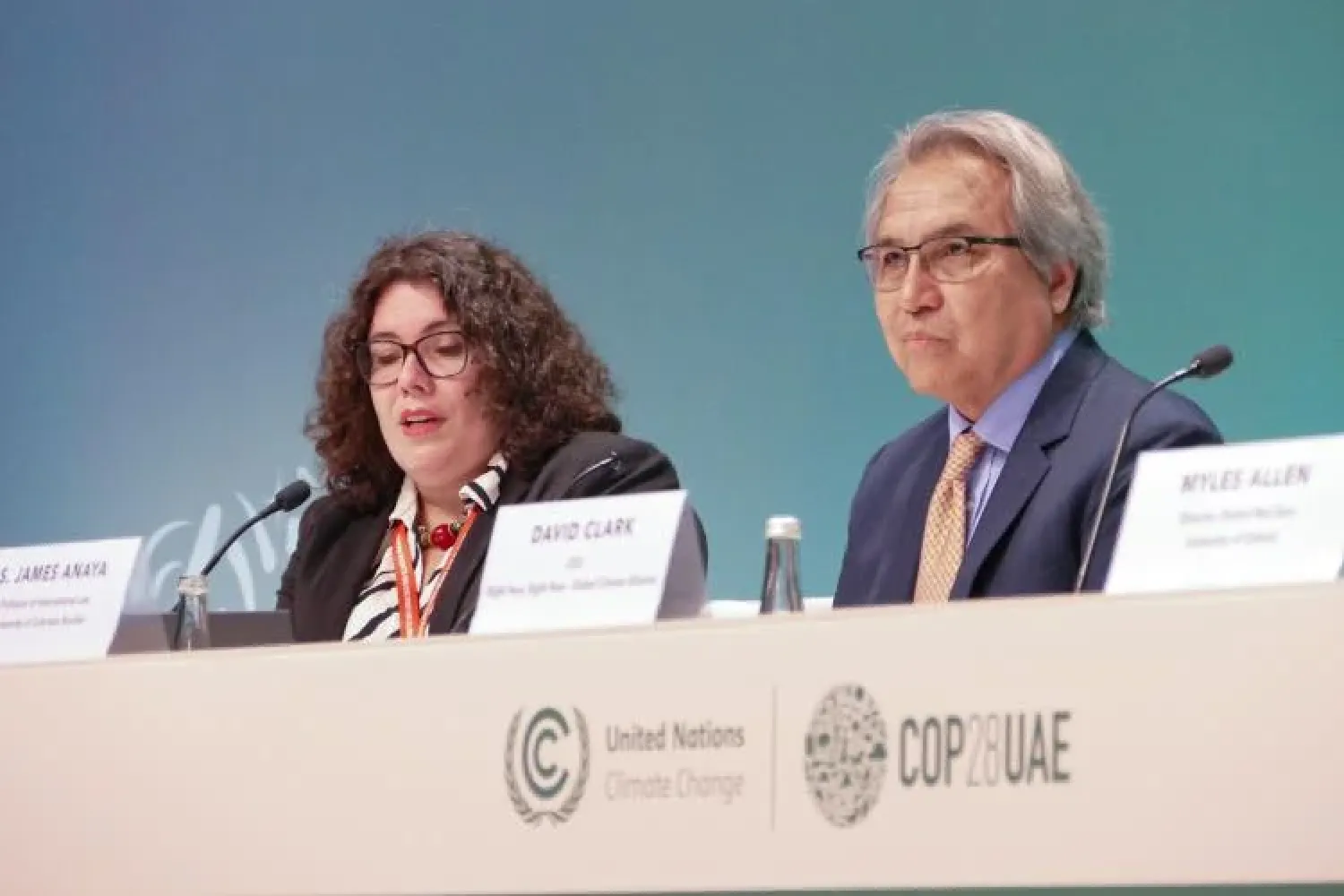Human rights climate commitments released in Dubai

Ana Paula De Sauza (left), human rights officer for the UN Office of the High Commissioner for Human Rights, and S. James Anaya (right), CU Boulder distinguished international law professor and a former UN special rapporteur on the rights of Indigenous peoples
Draft commitments for states
- Commit to a human rights-based approach to economic and non-economic loss and damage, including in operationalizing the loss and damage fund
- Formally recognize and protect the land and resource rights of people disproportionately affected by climate change including Indigenous peoples, Afro-descendants, and local communities
Draft commitments for higher education
- Provide funding for and undertake research to address the increased risk of, for example, natural disasters, extreme weather events, grid failures and shocks in energy prices, food and water shortages, and housing scarcity
- Design curricular offerings to students related to the impact of climate change on human rights, with special focus on persons, groups and peoples in vulnerable situations and the technological solutions available to mitigate climate change
Draft commitments for business
- Commit to a rapid and equitable phase out of fossil fuels in operations and investments
- Complete an annual climate inventory and risk assessment report
At the 2023 United Nations Climate Change Conference (COP28) in Dubai, the Right Here, Right Now Global Climate Alliance unveiled the first iteration of a groundbreaking initiative for rights-based climate action, the Right Here, Right Now Human Rights Climate Commitments (HRCC).
The rights-based commitments, developed in collaboration with UN Human Rights (UNHR), are based on the specific human rights obligations and responsibilities of states and other actors. The commitments began to take shape at the first Right Here, Right Now Global Climate Summit held at CU Boulder in December 2022. The summit was attended by people representing approximately 100 countries.
S. James Anaya, CU Boulder distinguished international law professor and a former UN special rapporteur on the rights of Indigenous peoples, led the drafting of the commitments, which involved experts from around the world. The alliance is now asking for global feedback from various sectors—from business to education.
“The commitments place human rights at the center of climate policy and seek to ensure that climate action has human rights as its main objective,” said Anaya. “They provide guide posts to what different governments, businesses and institutions of higher education need to do to address climate change.”
The commitments are tailored to the major actors that hold obligations or responsibilities regarding human rights, including independent states, sub-national governments, businesses and educational institutions. In the build-up to COP29, these actors will be asked to take on these commitments and announce their pledges, which will then be verified for compliance.
At the COP press conference Friday, Ana Paula De Sauza, human rights officer for the UN Office of the High Commissioner for Human Rights, said that rights-based climate action leads to more effective and sustainable outcomes. The commitments she and other panelists unveiled at COP28 are meant to offer guidance to duty bearers that will help them work more effectively to advance human rights, including a right to a clean, healthy and sustainable environment through climate action.
“In short, we want and desperately need climate justice now, and this is what people across the world are demanding,” De Sauza said, noting that the commitments are “not optional.”
“They are necessary—critical to human survival,” she said. “The commitments are inspired by the Universal Declaration of Human Rights and the framework of human rights treaties that followed. They are the action we need now. The action that is required of us.”
In addition to highlighting the commitments, it was announced that the University of Oxford will take over as co-host of the Right Here, Right Now Global Climate Summit to be held Sept. 11–14, 2024.
Meantime, CU Boulder is soliciting feedback from the Right Here, Right Now Education Coalition members, sharing existing curricular resources and promoting Right Here, Right Now Global Alliance programming and activities to encourage the coalition's growth and engagement in the cause of accelerating human rights-based climate solutions.
To launch this year’s programming, the Right Here, Right Now Global Climate Alliance has garnered support from celebrities including Demi Lovato, Cyndi Lauper, Annie Lennox, Carole King, Laura Pausini, Rob Thomas, Jeff Bridges and Chelsea Handler for climate justice and to commemorate the 75th anniversary on Dec. 10 of the Universal Declaration of Human Rights.


